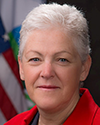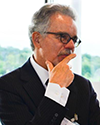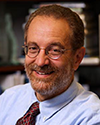 Friday, April 20, 2018
Friday, April 20, 2018
8:30 a.m.–2:30 p.m.
Hiebert Lounge
72 East Concord Street
Boston
#BUSPHSymposia
Climate change will have enormous impacts on human health and well-being throughout the world. In response, many cities are developing farsighted policies to reduce carbon emissions while also adapting to ongoing changes. However, high-level political support for climate action remains weak, and policymakers need to be able to articulate the benefits of their climate policies. Public health researchers are documenting how urban climate solutions can directly benefit the health of local residents, but this research has not yet been communicated in a manner that has motivated effective action. This symposium will bring together thought leaders from public health, cities, and journalism to develop strategies that bring greater attention to—and produce visionary actions that address—the global climate challenge. Co-hosted with the Pulitzer Center. Additional collaborators include Boston University Initiative on Cities; Center for Climate, Health, and the Global Environment at Harvard T.H. Chan School of Public Health; Innovate@BU; and Sustainability@BU.
CITIES AS DRIVERS OF CLIMATE SOLUTIONS
CLIMATE AND HEALTH COMMUNICATION
Agenda
8 a.m. – 8:30 a.m.
Breakfast and Informal Greetings
8:30 a.m. – 8:40 a.m.
OPENING REMARKS
Welcome
Dean and Robert A. Knox Professor, Boston University School of Public Health
Beverly Brown Professor of Urban Health, Boston University School of Public Health
Jon Sawyer
Executive Director, Pulitzer Center
Read More

Jon Sawyer is executive director of the Pulitzer Center. The center partners with major newspapers, magazines, and broadcast outlets as well as universities and high schools across the United States. It has won an Emmy for new approaches to news and documentary, the Asia Society’s Goldman Sachs Foundation Prize for best use of technology in international education, and best online journalism prizes from the National Press Foundation, the Society of Professional Journalists, and the National Press Club. Sawyer’s projects for the Pulitzer Center have included reporting from the Democratic Republic of the Congo, India, Bangladesh, China, Haiti, and the Caucasus. His work has been featured in the
Los Angeles Times,
The Atlantic,
The Washington Post, al Jazeera English,
Nieman Reports,
To the Point, and
PBS NewsHour. He was co-executive producer of “LiveHopeLove.com,” the center’s Emmy Award-winning website on HIV in Jamaica, and also of
The Abominable Crime, a feature-length documentary on homophobia and stigma. He was also executive producer of
Searching for Sacred Mountain, a short documentary on the intersection of religion and environment in China. Sawyer was previously the
St. Louis Post-Dispatch Washington bureau chief. His assignments took him to some five dozen countries, with special projects ranging from Africa, the Caribbean, and Latin America to Eastern Europe, the former Soviet Union, the Middle East, the Balkans, and China. His work has been honored by Investigative Reporters and Editors, the Overseas Press Club, the Inter-American Press Association, and the School of Foreign Service at Georgetown University. Sawyer was selected three years in a row for the National Press Club’s prize for best foreign reporting. He holds a BA from Yale University and has held journalism fellowships at Princeton, Harvard, and Columbia universities.
8:40 a.m. – 9:10 a.m.
KEYNOTE
Gina McCarthy
Former Administrator, United States Environmental Protection Agency and Professor of the Practice of Public Health, Environmental Health, Harvard T.H. Chan School of Public Health
Read More
 Gina McCarthy’s 35-year career in public service has been dedicated to environmental protection and public health. As administrator of the US Environmental Protection Agency under President Barack Obama, she was the nation’s leading advocate for common-sense strategies to protect public health and the environment, including efforts to address the challenge of climate change and ensure the protection of the country’s water resources. Her leadership led to significant federal, state, and local actions on critical issues related to the environment, economic growth, energy, and transportation. Since leaving Washington, McCarthy has been a Fellow at Harvard Kennedy School of Government’s Institute of Politics and the Menschel Senior Leadership Fellow at Harvard T.H. Chan School of Public Health. McCarthy now serves as Professor of the Practice of Public Health in the Department of Environmental Health at Harvard T.H. Chan School of Public Health and as director of the Center for Health and the Global Environment, leading the development of the school’s strategy in climate science, health, and sustainability.
Gina McCarthy’s 35-year career in public service has been dedicated to environmental protection and public health. As administrator of the US Environmental Protection Agency under President Barack Obama, she was the nation’s leading advocate for common-sense strategies to protect public health and the environment, including efforts to address the challenge of climate change and ensure the protection of the country’s water resources. Her leadership led to significant federal, state, and local actions on critical issues related to the environment, economic growth, energy, and transportation. Since leaving Washington, McCarthy has been a Fellow at Harvard Kennedy School of Government’s Institute of Politics and the Menschel Senior Leadership Fellow at Harvard T.H. Chan School of Public Health. McCarthy now serves as Professor of the Practice of Public Health in the Department of Environmental Health at Harvard T.H. Chan School of Public Health and as director of the Center for Health and the Global Environment, leading the development of the school’s strategy in climate science, health, and sustainability.
9:10 a.m. – 10:30 a.m.
CLIMATE AND HEALTH: IMPACTS AND OPPORTUNITIES
Key Lecturer
Beverly Brown Professor of Urban Health, Boston University School of Public Health
Panelists
Austin Blackmon
Chief of Environment, Energy, and Open Space, City of Boston
Read More
 Austin Blackmon is the City of Boston’s Chief of Environment, Energy, and Open Space, where he leads the Environment, Parks and Recreation, and Inspectional Services departments. As part of the Walsh administration, Blackmon spearheads the development and implementation of Boston’s Climate Action Plan and works to keep Boston a national leader in energy policy. Prior to joining the Walsh administration in 2014, Blackmon was interim head of project finance for Terraverde Renewable Partners. His other previous experience includes consulting at Booz Allen Hamilton’s Strategy and Operations group, Energy Investment Banking at Wells Fargo Securities, business development at C12 Energy, and advising the US Renewables Group. A native of the Great Lakes region, Blackmon has spent over 12 years in New England, is a graduate of Harvard College, and holds an MBA from Harvard Business School.
Austin Blackmon is the City of Boston’s Chief of Environment, Energy, and Open Space, where he leads the Environment, Parks and Recreation, and Inspectional Services departments. As part of the Walsh administration, Blackmon spearheads the development and implementation of Boston’s Climate Action Plan and works to keep Boston a national leader in energy policy. Prior to joining the Walsh administration in 2014, Blackmon was interim head of project finance for Terraverde Renewable Partners. His other previous experience includes consulting at Booz Allen Hamilton’s Strategy and Operations group, Energy Investment Banking at Wells Fargo Securities, business development at C12 Energy, and advising the US Renewables Group. A native of the Great Lakes region, Blackmon has spent over 12 years in New England, is a graduate of Harvard College, and holds an MBA from Harvard Business School.Hannah Fairfield
Climate Editor, The New York Times
Read More
 Hannah Fairfield is the climate editor at The New York Times. She joined the Times in 2000 as a graphics editor, and later helped to lead their award-winning graphics department. She received two master’s degrees from Columbia University and taught data visualization at the Columbia Graduate School of Journalism for six years. Projects she has worked on have won Pulitzer, Peabody, Loeb, and Polk awards.
Hannah Fairfield is the climate editor at The New York Times. She joined the Times in 2000 as a graphics editor, and later helped to lead their award-winning graphics department. She received two master’s degrees from Columbia University and taught data visualization at the Columbia Graduate School of Journalism for six years. Projects she has worked on have won Pulitzer, Peabody, Loeb, and Polk awards.Barbara Ferrer (SPH’88)
Director, Los Angeles County Department of Public Health
Read More
 Barbara Ferrer is the director of the Los Angeles County Department of Public Health, which works to protect and promote health and prevent disease in communities across the county. She oversees a budget of more than $900 million and directs a workforce of 4,000 public health practitioners. Ferrer is a nationally known public health leader with more than 30 years of professional experience as a philanthropic strategist, public health director, educational leader, researcher, and community advocate. Most recently, Ferrer served as the chief strategy officer for the W.K. Kellogg Foundation, where she was responsible for developing the strategic direction for critical program-related work and providing leadership to the foundation’s key program areas. Prior to that, Ferrer served as the executive director of the Boston Public Health Commission, where she led a range of public health programs and built innovative partnerships to address the inequities in health outcomes and to support healthy communities and healthy families. Ferrer has also served as director of Health Promotion and Chronic Disease Prevention and as director of the Division of Maternal and Child Health at the Massachusetts Department of Public Health. As a headmaster at a district high school in Boston, she led efforts to significantly improve high school graduation rates and ensure that every graduating senior was accepted to college. Ferrer holds a PhD in social welfare from Brandeis University, an MA in public health from Boston University, an MEd from the University of Massachusetts, Boston, and a BA in community studies from the University of California, Santa Cruz.
Barbara Ferrer is the director of the Los Angeles County Department of Public Health, which works to protect and promote health and prevent disease in communities across the county. She oversees a budget of more than $900 million and directs a workforce of 4,000 public health practitioners. Ferrer is a nationally known public health leader with more than 30 years of professional experience as a philanthropic strategist, public health director, educational leader, researcher, and community advocate. Most recently, Ferrer served as the chief strategy officer for the W.K. Kellogg Foundation, where she was responsible for developing the strategic direction for critical program-related work and providing leadership to the foundation’s key program areas. Prior to that, Ferrer served as the executive director of the Boston Public Health Commission, where she led a range of public health programs and built innovative partnerships to address the inequities in health outcomes and to support healthy communities and healthy families. Ferrer has also served as director of Health Promotion and Chronic Disease Prevention and as director of the Division of Maternal and Child Health at the Massachusetts Department of Public Health. As a headmaster at a district high school in Boston, she led efforts to significantly improve high school graduation rates and ensure that every graduating senior was accepted to college. Ferrer holds a PhD in social welfare from Brandeis University, an MA in public health from Boston University, an MEd from the University of Massachusetts, Boston, and a BA in community studies from the University of California, Santa Cruz.Joanne Silberner
Independent Journalist and Artist-in-Residence, University of Washington
Read More
 Joanne Silberner is an independent journalist and an artist-in-residence at the University of Washington. Her work has appeared in and on NPR, Discover magazine, the BBC, the BBC/PRI show “The World,” Global Health Now, and other media outlets. For 18 years, Silberner was a health policy correspondent at NPR, covering medicine, health policy, mental health, global health, and climate change. Prior to that, she spent five years covering consumer health and medical research at U.S. News & World Report. In addition, Silberner has worked at Science News magazine and Science Digest. Since 2010, she has been teaching advanced radio and narrative journalism courses in the Department of Communication at the University of Washington. Her stories on climate change primarily focus on health. One 2014 series took a close look at the mental health effects of climate change in Australia and Fiji. Silberner has had a variety of fellowships, including a Rosalynn Carter Fellowship for Mental Health Journalism, a fellowship at the Harvard T.H. Chan School of Public Health, a Kaiser Family Foundation Media Fellowship, and a fellowship to study the survivors of the bombings of Hiroshima and Nagasaki. She has received several travel grants from the Pulitzer Center to report from developing countries about topics including cancer, noncommunicable diseases, and the mental health effects of climate change. Silberner won the National Academies/Keck Award and a Best Cancer Reporter Award from the European School of Oncology, the Victor Cohn Prize for Excellence in Medical Science Reporting, and awards from the Society of Professional Journalists, the American Heart Association, and other organizations. She was also part of the NPR teams that won national awards for reporting on climate change, 9/11, and American songs. Silberner holds an undergraduate degree in biology from Johns Hopkins University, and a master’s degree in journalism from Columbia University.
Joanne Silberner is an independent journalist and an artist-in-residence at the University of Washington. Her work has appeared in and on NPR, Discover magazine, the BBC, the BBC/PRI show “The World,” Global Health Now, and other media outlets. For 18 years, Silberner was a health policy correspondent at NPR, covering medicine, health policy, mental health, global health, and climate change. Prior to that, she spent five years covering consumer health and medical research at U.S. News & World Report. In addition, Silberner has worked at Science News magazine and Science Digest. Since 2010, she has been teaching advanced radio and narrative journalism courses in the Department of Communication at the University of Washington. Her stories on climate change primarily focus on health. One 2014 series took a close look at the mental health effects of climate change in Australia and Fiji. Silberner has had a variety of fellowships, including a Rosalynn Carter Fellowship for Mental Health Journalism, a fellowship at the Harvard T.H. Chan School of Public Health, a Kaiser Family Foundation Media Fellowship, and a fellowship to study the survivors of the bombings of Hiroshima and Nagasaki. She has received several travel grants from the Pulitzer Center to report from developing countries about topics including cancer, noncommunicable diseases, and the mental health effects of climate change. Silberner won the National Academies/Keck Award and a Best Cancer Reporter Award from the European School of Oncology, the Victor Cohn Prize for Excellence in Medical Science Reporting, and awards from the Society of Professional Journalists, the American Heart Association, and other organizations. She was also part of the NPR teams that won national awards for reporting on climate change, 9/11, and American songs. Silberner holds an undergraduate degree in biology from Johns Hopkins University, and a master’s degree in journalism from Columbia University.Moderator
Kathy Fallon Lambert
Director, Science Policy Exchange, Harvard Forest
Read More
 Kathy Fallon Lambert is the director of the Science Policy Exchange at Harvard University, Harvard Forest. Fallon Lambert has led successful initiatives at the interface of clean air science, policy, and communication for nearly two decades. Her groundbreaking work combines policy-relevant synthesis with media strategies and outreach to decision-makers on topics such as acid rain, mercury pollution, and, most recently, the health benefits of power plant carbon standards. Fallon Lambert is part of a multi-institutional team launching a new Climate Solutions Accelerator to advance the health benefits of climate action at local, state, and federal levels. Previously, she served as executive director of the Hubbard Brook Research Foundation where she created the Science Links program. Fallon Lambert consults to research organizations interested in building interdisciplinary programs with impact beyond the ivory tower. She is a Switzer Fellow, Leopold Schepp Scholar, and recipient of the US EPA Environmental Merit Award. Fallon Lambert holds a bachelor’s degree in sociology and environmental studies from Dartmouth College and a master’s degree from the Yale School of Forestry and Environmental Studies.
Kathy Fallon Lambert is the director of the Science Policy Exchange at Harvard University, Harvard Forest. Fallon Lambert has led successful initiatives at the interface of clean air science, policy, and communication for nearly two decades. Her groundbreaking work combines policy-relevant synthesis with media strategies and outreach to decision-makers on topics such as acid rain, mercury pollution, and, most recently, the health benefits of power plant carbon standards. Fallon Lambert is part of a multi-institutional team launching a new Climate Solutions Accelerator to advance the health benefits of climate action at local, state, and federal levels. Previously, she served as executive director of the Hubbard Brook Research Foundation where she created the Science Links program. Fallon Lambert consults to research organizations interested in building interdisciplinary programs with impact beyond the ivory tower. She is a Switzer Fellow, Leopold Schepp Scholar, and recipient of the US EPA Environmental Merit Award. Fallon Lambert holds a bachelor’s degree in sociology and environmental studies from Dartmouth College and a master’s degree from the Yale School of Forestry and Environmental Studies.
10:30 a.m. – 10:50 a.m.
Break
10:50 a.m. – 12:20 p.m.
CITIES AS DRIVERS OF CLIMATE SOLUTIONS
Key Lecturer
David Miller
Former Mayor of Toronto; and North America Regional Director and C40 Global Ambassador, Inclusive Climate Action
Read More
 David Miller is the North America Regional Director of the C40 Climate Leadership Group and global ambassador of Inclusive Climate Action. He served as chair of C40 Cities from 2008 until 2010. Prior to joining the C40, Miller served as president and CEO of World Wildlife Fund-Canada, Canada’s foremost conservation organization. The WWF creates solutions to the most serious conservation challenges facing our planet, helping people and nature thrive. Miller was mayor of Toronto from 2003 to 2010. Under his leadership, Toronto became widely admired internationally for its environmental leadership, economic strength, and social integration. He is a leading advocate for the creation of sustainable urban economies, and a strong and forceful champion for the next generation of jobs through sustainability. Miller has held a variety of public-sector and private-sector positions, and he served as Future of Cities Global Fellow at the Polytechnic Institute of New York University from 2011 to 2014. He is a Harvard-trained economist and professionally a lawyer. Miller and his wife, lawyer Jill Arthur, are the parents of two children.
David Miller is the North America Regional Director of the C40 Climate Leadership Group and global ambassador of Inclusive Climate Action. He served as chair of C40 Cities from 2008 until 2010. Prior to joining the C40, Miller served as president and CEO of World Wildlife Fund-Canada, Canada’s foremost conservation organization. The WWF creates solutions to the most serious conservation challenges facing our planet, helping people and nature thrive. Miller was mayor of Toronto from 2003 to 2010. Under his leadership, Toronto became widely admired internationally for its environmental leadership, economic strength, and social integration. He is a leading advocate for the creation of sustainable urban economies, and a strong and forceful champion for the next generation of jobs through sustainability. Miller has held a variety of public-sector and private-sector positions, and he served as Future of Cities Global Fellow at the Polytechnic Institute of New York University from 2011 to 2014. He is a Harvard-trained economist and professionally a lawyer. Miller and his wife, lawyer Jill Arthur, are the parents of two children.Panelists
Stacie Paxton Cobos
Senior Vice President for Communications and Marketing, The Climate Reality Project
Read More
 Stacie Paxton Cobos is senior vice president for communications and marketing at The Climate Reality Project, a leading nonprofit organization founded by former Vice President Al Gore to address the climate crisis. Paxton Cobos oversees all communications, creative content, marketing, and online fundraising for the organization, and leads Climate Reality’s signature event, 24 Hours of Reality, an Emmy-nominated 24-hour live global broadcast featuring celebrities, musicians, elected officials, and thought leaders reaching over a half a billion households on television and 32 million views online. Prior to joining Climate Reality, she was senior vice president at Hill+Knowlton Strategies, an international public relations firm, where she managed multifaceted communications campaigns, including earned and social media, content creation, and advertising for nonprofits, corporations, and trade associations. A veteran campaign strategist and spokeswoman, Paxton Cobos served as national press secretary at the Democratic National Committee from 2006 to 2009. She managed communications on three presidential campaigns and spent six years on Capitol Hill as a spokeswoman and senior advisor to members of Congress. Her experience also includes several years at CNN, where she oversaw publicity for the network’s anchors and programming.
Stacie Paxton Cobos is senior vice president for communications and marketing at The Climate Reality Project, a leading nonprofit organization founded by former Vice President Al Gore to address the climate crisis. Paxton Cobos oversees all communications, creative content, marketing, and online fundraising for the organization, and leads Climate Reality’s signature event, 24 Hours of Reality, an Emmy-nominated 24-hour live global broadcast featuring celebrities, musicians, elected officials, and thought leaders reaching over a half a billion households on television and 32 million views online. Prior to joining Climate Reality, she was senior vice president at Hill+Knowlton Strategies, an international public relations firm, where she managed multifaceted communications campaigns, including earned and social media, content creation, and advertising for nonprofits, corporations, and trade associations. A veteran campaign strategist and spokeswoman, Paxton Cobos served as national press secretary at the Democratic National Committee from 2006 to 2009. She managed communications on three presidential campaigns and spent six years on Capitol Hill as a spokeswoman and senior advisor to members of Congress. Her experience also includes several years at CNN, where she oversaw publicity for the network’s anchors and programming.Carlos Dora
Coordinator, Public Health and the Environment Department, World Health Organization
Read More
 Carlos Dora is a health policy expert with the World Health Organization, leading work on the health impacts of sector policies (energy, transport, housing, extractive industry) that involve health impact assessment and systems to manage health risks and benefits. He leads the development of a new urban health initiative to strengthen the capacity of cities to obtain health co-benefits from urban policies, as well as the WHO unit in charge of providing guidance on health risks (air pollution, indoors and outdoors, radiation, occupation) and monitoring, evaluating, and tracking related policies and health impacts. Dora leads WHO’s work on “Health in a Green Economy,” focusing on the health benefits from climate change mitigation policies, and is contributing to WHO’s work on health indicators for post-2015 Sustainable Development Goals. He is engaged in the health co-benefits of sustainable energy initiatives, including SE4All, GACC, and CCAC. Dora previously worked at the London School of Hygiene and Tropical Medicine, at the WHO Regional Office for Europe, with the World Bank, and as a senior policy advisor to the WHO director general. Previously, he worked in the organization of primary care systems in Brazil, where he also practiced clinical medicine. He has served on many policy committees. His publications cover the health impacts of sector policies, health impact assessment, and health risk communication. He earned an MSc and a PhD from the London School of Hygiene and Tropical Medicine.
Carlos Dora is a health policy expert with the World Health Organization, leading work on the health impacts of sector policies (energy, transport, housing, extractive industry) that involve health impact assessment and systems to manage health risks and benefits. He leads the development of a new urban health initiative to strengthen the capacity of cities to obtain health co-benefits from urban policies, as well as the WHO unit in charge of providing guidance on health risks (air pollution, indoors and outdoors, radiation, occupation) and monitoring, evaluating, and tracking related policies and health impacts. Dora leads WHO’s work on “Health in a Green Economy,” focusing on the health benefits from climate change mitigation policies, and is contributing to WHO’s work on health indicators for post-2015 Sustainable Development Goals. He is engaged in the health co-benefits of sustainable energy initiatives, including SE4All, GACC, and CCAC. Dora previously worked at the London School of Hygiene and Tropical Medicine, at the WHO Regional Office for Europe, with the World Bank, and as a senior policy advisor to the WHO director general. Previously, he worked in the organization of primary care systems in Brazil, where he also practiced clinical medicine. He has served on many policy committees. His publications cover the health impacts of sector policies, health impact assessment, and health risk communication. He earned an MSc and a PhD from the London School of Hygiene and Tropical Medicine.Nathaniel Rich
Author and Writer-at-Large, The New York Times Magazine
Read More
 Nathaniel Rich is the author of three novels: Odds Against Tomorrow, The Mayor’s Tongue, and, most recently, King Zeno. He is a writer-at-large for The New York Times Magazine, and his essays on literature appear regularly in the Atlantic and the New York Review of Books. His reported pieces for the Times, Harper’s, Rolling Stone, and Vice have appeared in various anthologies, including The Best American Nonrequired Reading and The Best American Science and Nature Writing. A collection of his essays about environmental themes is forthcoming from Farrar, Straus & Giroux. Rich lives in New Orleans.
Nathaniel Rich is the author of three novels: Odds Against Tomorrow, The Mayor’s Tongue, and, most recently, King Zeno. He is a writer-at-large for The New York Times Magazine, and his essays on literature appear regularly in the Atlantic and the New York Review of Books. His reported pieces for the Times, Harper’s, Rolling Stone, and Vice have appeared in various anthologies, including The Best American Nonrequired Reading and The Best American Science and Nature Writing. A collection of his essays about environmental themes is forthcoming from Farrar, Straus & Giroux. Rich lives in New Orleans.Moderator
Chair and Professor, Environmental Health, Boston University School of Public Health
12:20 p.m. – 1 p.m.
Lunch
1 p.m. – 2:20 p.m.
CLIMATE AND HEALTH COMMUNICATION
Key Lecturer
Edward Wile Maibach
University Professor, Director; Center for Climate Change Communication, George Mason University
Read More
 Edward Wile Maibach is a distinguished University Professor at George Mason University, and director of its Center for Climate Change Communication. His research—funded by the National Science Foundation, NASA, and private foundations—focuses on public engagement in climate change. He previously served as worldwide director of social marketing at Porter Novelli, associate director of the National Cancer Institute, and board chair for Kidsave International. Maibach earned an MPH at San Diego State University and a PhD in communication science at Stanford.
Edward Wile Maibach is a distinguished University Professor at George Mason University, and director of its Center for Climate Change Communication. His research—funded by the National Science Foundation, NASA, and private foundations—focuses on public engagement in climate change. He previously served as worldwide director of social marketing at Porter Novelli, associate director of the National Cancer Institute, and board chair for Kidsave International. Maibach earned an MPH at San Diego State University and a PhD in communication science at Stanford.Panelists
Jack Cushman
Managing Editor, InsideClimate News
Read More
 Jack Cushman is the managing editor and a reporter for InsideClimate News. Before joining ICN, he worked for 35 years as a writer and editor in Washington, DC, principally with the Washington bureau of The New York Times. Cushman has written extensively about energy, the environment, industry, and military affairs, also covering financial and transportation beats and editing articles across the full spectrum of national and international policy. He served on the board of governors of the National Press Club and was its president in 2000. Cushman is the author of Keystone and Beyond: Tar Sands and the National Interest in the Era of Climate Change.
Jack Cushman is the managing editor and a reporter for InsideClimate News. Before joining ICN, he worked for 35 years as a writer and editor in Washington, DC, principally with the Washington bureau of The New York Times. Cushman has written extensively about energy, the environment, industry, and military affairs, also covering financial and transportation beats and editing articles across the full spectrum of national and international policy. He served on the board of governors of the National Press Club and was its president in 2000. Cushman is the author of Keystone and Beyond: Tar Sands and the National Interest in the Era of Climate Change.Howard Frumkin
Professor, Environmental and Occupational Health Sciences, School of Public Health, University of Washington
Read More
 Howard Frumkin is a professor of environmental and occupational health sciences at the University of Washington School of Public Health, where he served as dean from 2010 to 2016. He is an internist, environmental and occupational medicine specialist, and epidemiologist. Previously, he directed the National Center for Environmental Health and Agency for Toxic Substances and Disease Registry at the US Centers for Disease Control and Prevention (2005–2010) and was a professor and the chair of environmental and occupational health at Emory University’s Rollins School of Public Health (1990–2005). Frumkin’s research interests include the public health aspects of the built environment, climate change, energy policy, and nature contact. He currently serves on the boards of the Bullitt Foundation and the Seattle Parks Foundation, on the NASEM Committee on Measuring Community Resilience, on the Steering Committee of the Planetary Health Alliance (Harvard University), and on advisory committees to the Wellcome Trust “Our Planet, Our Health” initiative, the Global Consortium on Climate and Health Education (Columbia University), the Medical Society Consortium on Climate and Health (George Mason University), and the Canadian Urban Environmental Health Research Consortium (University of Toronto). He is the author or coauthor of more than 200 scientific journal articles and chapters. His books include Urban Sprawl and Public Health (2004); Emerging Illness and Society (2004); Safe and Healthy School Environments (2006); Green Healthcare Institutions: Health, Environment, Economics (2007); Making Healthy Places: Designing and Building for Health, Well-Being, and Sustainability (2011); and Environmental Health: From Global to Local (third edition, 2016). Frumkin holds an AB from Brown University, an MD from the University of Pennsylvania, and an MPH and DrPH from Harvard University.
Howard Frumkin is a professor of environmental and occupational health sciences at the University of Washington School of Public Health, where he served as dean from 2010 to 2016. He is an internist, environmental and occupational medicine specialist, and epidemiologist. Previously, he directed the National Center for Environmental Health and Agency for Toxic Substances and Disease Registry at the US Centers for Disease Control and Prevention (2005–2010) and was a professor and the chair of environmental and occupational health at Emory University’s Rollins School of Public Health (1990–2005). Frumkin’s research interests include the public health aspects of the built environment, climate change, energy policy, and nature contact. He currently serves on the boards of the Bullitt Foundation and the Seattle Parks Foundation, on the NASEM Committee on Measuring Community Resilience, on the Steering Committee of the Planetary Health Alliance (Harvard University), and on advisory committees to the Wellcome Trust “Our Planet, Our Health” initiative, the Global Consortium on Climate and Health Education (Columbia University), the Medical Society Consortium on Climate and Health (George Mason University), and the Canadian Urban Environmental Health Research Consortium (University of Toronto). He is the author or coauthor of more than 200 scientific journal articles and chapters. His books include Urban Sprawl and Public Health (2004); Emerging Illness and Society (2004); Safe and Healthy School Environments (2006); Green Healthcare Institutions: Health, Environment, Economics (2007); Making Healthy Places: Designing and Building for Health, Well-Being, and Sustainability (2011); and Environmental Health: From Global to Local (third edition, 2016). Frumkin holds an AB from Brown University, an MD from the University of Pennsylvania, and an MPH and DrPH from Harvard University.Sabrina McCormick
Associate Professor, Environmental and Occupational Health, Milken Institute School of Public Health, George Washington University and Senior Fellow, Wharton School, University of Pennsylvania
Read More
 Sabrina McCormick is an associate professor of environmental and occupational health at the George Washington University Milken Institute School of Public Health and a Senior Fellow at the University of Pennsylvania’s Wharton School. McCormick is also a sociologist and a filmmaker. She currently investigates how diverse audiences respond to stories about climate change, how climate change lawsuits are won and lost, and why cities can fail in their address of climate change. McCormick’s film work includes her current feature fiction film, Tribe, set in the Brazilian Amazon, and the Emmy Award-winning Showtime series, “The Years of Living Dangerously,” among other projects. She is currently Advisory Committee member of the Climate Change Communications Initiative of the National Academies of Sciences. She was lead author on the Nobel Prize-winning Intergovernmental Panel on Climate Change, and has advised Congress, the State Department, and the White House. McCormick’s work has been featured on NBC Nightly News and NPR, in TIME Magazine and the Chicago Tribune, and in many other media outlets.
Sabrina McCormick is an associate professor of environmental and occupational health at the George Washington University Milken Institute School of Public Health and a Senior Fellow at the University of Pennsylvania’s Wharton School. McCormick is also a sociologist and a filmmaker. She currently investigates how diverse audiences respond to stories about climate change, how climate change lawsuits are won and lost, and why cities can fail in their address of climate change. McCormick’s film work includes her current feature fiction film, Tribe, set in the Brazilian Amazon, and the Emmy Award-winning Showtime series, “The Years of Living Dangerously,” among other projects. She is currently Advisory Committee member of the Climate Change Communications Initiative of the National Academies of Sciences. She was lead author on the Nobel Prize-winning Intergovernmental Panel on Climate Change, and has advised Congress, the State Department, and the White House. McCormick’s work has been featured on NBC Nightly News and NPR, in TIME Magazine and the Chicago Tribune, and in many other media outlets.Moderator
Jon Sawyer
Executive Director, Pulitzer Center
Read More

Jon Sawyer is executive director of the Pulitzer Center. The center partners with major newspapers, magazines, and broadcast outlets as well as universities and high schools across the United States. It has won an Emmy for new approaches to news and documentary, the Asia Society’s Goldman Sachs Foundation Prize for best use of technology in international education, and best online journalism prizes from the National Press Foundation, the Society of Professional Journalists, and the National Press Club. Sawyer’s projects for the Pulitzer Center have included reporting from the Democratic Republic of the Congo, India, Bangladesh, China, Haiti, and the Caucasus. His work has been featured in the
Los Angeles Times,
The Atlantic,
The Washington Post, al Jazeera English,
Nieman Reports,
To the Point, and
PBS NewsHour. He was co-executive producer of “LiveHopeLove.com,” the center’s Emmy Award-winning website on HIV in Jamaica, and also of
The Abominable Crime, a feature-length documentary on homophobia and stigma. He was also executive producer of
Searching for Sacred Mountain, a short documentary on the intersection of religion and environment in China. Sawyer was previously the
St. Louis Post-Dispatch Washington bureau chief. His assignments took him to some five dozen countries, with special projects ranging from Africa, the Caribbean, and Latin America to Eastern Europe, the former Soviet Union, the Middle East, the Balkans, and China. His work has been honored by Investigative Reporters and Editors, the Overseas Press Club, the Inter-American Press Association, and the School of Foreign Service at Georgetown University. Sawyer was selected three years in a row for the National Press Club’s prize for best foreign reporting. He holds a BA from Yale University and has held journalism fellowships at Princeton, Harvard, and Columbia universities.
2:20 p.m. – 2:30 p.m.
CONCLUSION
Beverly Brown Professor of Urban Health, Boston University School of Public Health
Jon Sawyer
Executive Director, Pulitzer Center
Read More

Jon Sawyer is executive director of the Pulitzer Center. The center partners with major newspapers, magazines, and broadcast outlets as well as universities and high schools across the United States. It has won an Emmy for new approaches to news and documentary, the Asia Society’s Goldman Sachs Foundation Prize for best use of technology in international education, and best online journalism prizes from the National Press Foundation, the Society of Professional Journalists, and the National Press Club. Sawyer’s projects for the Pulitzer Center have included reporting from the Democratic Republic of the Congo, India, Bangladesh, China, Haiti, and the Caucasus. His work has been featured in the
Los Angeles Times,
The Atlantic,
The Washington Post, al Jazeera English,
Nieman Reports,
To the Point, and
PBS NewsHour. He was co-executive producer of “LiveHopeLove.com,” the center’s Emmy Award-winning website on HIV in Jamaica, and also of
The Abominable Crime, a feature-length documentary on homophobia and stigma. He was also executive producer of
Searching for Sacred Mountain, a short documentary on the intersection of religion and environment in China. Sawyer was previously the
St. Louis Post-Dispatch Washington bureau chief. His assignments took him to some five dozen countries, with special projects ranging from Africa, the Caribbean, and Latin America to Eastern Europe, the former Soviet Union, the Middle East, the Balkans, and China. His work has been honored by Investigative Reporters and Editors, the Overseas Press Club, the Inter-American Press Association, and the School of Foreign Service at Georgetown University. Sawyer was selected three years in a row for the National Press Club’s prize for best foreign reporting. He holds a BA from Yale University and has held journalism fellowships at Princeton, Harvard, and Columbia universities.
 Friday, April 20, 2018
Friday, April 20, 2018
 Jon Sawyer is executive director of the Pulitzer Center. The center partners with major newspapers, magazines, and broadcast outlets as well as universities and high schools across the United States. It has won an Emmy for new approaches to news and documentary, the Asia Society’s Goldman Sachs Foundation Prize for best use of technology in international education, and best online journalism prizes from the National Press Foundation, the Society of Professional Journalists, and the National Press Club. Sawyer’s projects for the Pulitzer Center have included reporting from the Democratic Republic of the Congo, India, Bangladesh, China, Haiti, and the Caucasus. His work has been featured in the
Jon Sawyer is executive director of the Pulitzer Center. The center partners with major newspapers, magazines, and broadcast outlets as well as universities and high schools across the United States. It has won an Emmy for new approaches to news and documentary, the Asia Society’s Goldman Sachs Foundation Prize for best use of technology in international education, and best online journalism prizes from the National Press Foundation, the Society of Professional Journalists, and the National Press Club. Sawyer’s projects for the Pulitzer Center have included reporting from the Democratic Republic of the Congo, India, Bangladesh, China, Haiti, and the Caucasus. His work has been featured in the





 David Miller is the North America Regional Director of the C40 Climate Leadership Group and global ambassador of Inclusive Climate Action. He served as chair of C40 Cities from 2008 until 2010. Prior to joining the C40, Miller served as president and CEO of World Wildlife Fund-Canada, Canada’s foremost conservation organization. The WWF creates solutions to the most serious conservation challenges facing our planet, helping people and nature thrive. Miller was mayor of Toronto from 2003 to 2010. Under his leadership, Toronto became widely admired internationally for its environmental leadership, economic strength, and social integration. He is a leading advocate for the creation of sustainable urban economies, and a strong and forceful champion for the next generation of jobs through sustainability. Miller has held a variety of public-sector and private-sector positions, and he served as Future of Cities Global Fellow at the Polytechnic Institute of New York University from 2011 to 2014. He is a Harvard-trained economist and professionally a lawyer. Miller and his wife, lawyer Jill Arthur, are the parents of two children.
David Miller is the North America Regional Director of the C40 Climate Leadership Group and global ambassador of Inclusive Climate Action. He served as chair of C40 Cities from 2008 until 2010. Prior to joining the C40, Miller served as president and CEO of World Wildlife Fund-Canada, Canada’s foremost conservation organization. The WWF creates solutions to the most serious conservation challenges facing our planet, helping people and nature thrive. Miller was mayor of Toronto from 2003 to 2010. Under his leadership, Toronto became widely admired internationally for its environmental leadership, economic strength, and social integration. He is a leading advocate for the creation of sustainable urban economies, and a strong and forceful champion for the next generation of jobs through sustainability. Miller has held a variety of public-sector and private-sector positions, and he served as Future of Cities Global Fellow at the Polytechnic Institute of New York University from 2011 to 2014. He is a Harvard-trained economist and professionally a lawyer. Miller and his wife, lawyer Jill Arthur, are the parents of two children.





